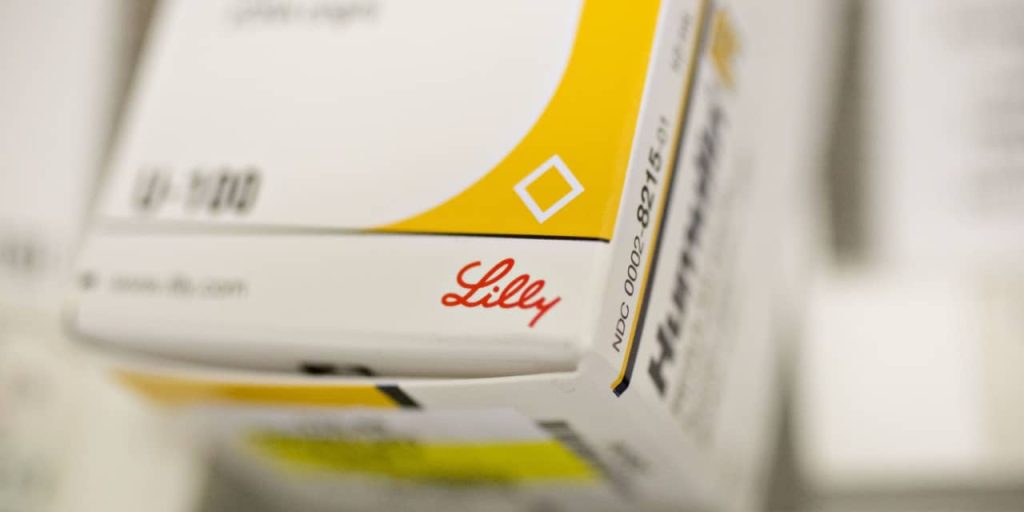The Food and Drug Administration on Wednesday approved a hotly anticipated
Eli Lilly
obesity treatment, cracking the lid on what is widely expected to be one of the top-selling medicines in history.
The Lilly drug, which will be marketed as an obesity treatment under the name Zepbound, is already sold as a diabetes treatment under the name Mounjaro. It will compete directly with
Novo Nordisk’s
(ticker: NVO) obesity drug Wegovy.
Lilly (LLY) took a direct shot at Novo on Wednesday, saying it will set a list price for Zepbound of $1,059.87 for a month’s supply, which it noted is lower than Wegovy’s list price of $1,349.02. That lower price point for Zepbound hints at a coming commercial rivalry with Novo—and the struggle to secure insurance coverage of the medicine in the U.S.
Lilly shares rose 3.2% following the announcement, while Novo’s American depositary receipts initially fell and then returned to flat at the close. Lilly executives said on a Wednesday afternoon press call that Zepbound will be available in U.S pharmacies “right after the Thanksgiving holiday.”
The announcement raised questions Wednesday about whether Zepbound’s lower list price would allow Novo to secure preferential insurance coverage for Wegovy. Pharmacy benefit managers, who negotiate with drugmakers on behalf of insurers, receive bigger rebates for higher-priced drugs, and can give higher-priced drugs better treatment in coverage lists.
On the press call, Lilly Diabetes president Michael Mason said that the company had opted for a lower list price in an effort to get more payers to choose to offer coverage of Zepbound.
“We priced the list price of Zepbound in order to improve and broaden access for anti-obesity medications,” Mason said. “As we were talking to the end payers, like the employers, they said that the list price was something that was a factor in their decision to expand access.”
Even ahead of its approval, Zepbound has become a cultural phenomenon with few analogues in the history of the pharmaceutical industry. Analysts expect unprecedented sales figures: Last year, a Bank of America analyst said combined sales of Mounjaro and the drug now known as Zepbound could hit $100 billion a year.
More recently, in late October, Citigroup analyst Andrew Baum wrote that he expects peak sales of $22 billion for Mounjaro and $37 billion for Zepbound.
The drugs are expected to have enormous impacts across the healthcare system and society at large. Demand for the medicines could put enormous pressure on employers, insurers, and government programs that pay for medicines in the U.S. Estimates suggest that widespread coverage for medicines like Zepbound could create an acute spending crisis for some payers.
At the same time, the health benefits of the medicines could impact the demand for a dizzying range of products, from junk foods to sleep apnea machines to glucose monitors used by diabetes patients.
Novo has had trouble meeting demand for Wegovy, but Lilly executives said that supply of their diabetes drug Mounjaro is no longer constrained in the U.S., and said that they would ramp up production to meet demand for Zepbound.
“There’s a lot of room to grow the capacity,” Lilly CEO David Ricks said Wednesday. “Lilly hopes to fulfill as much of that as we can. It will take some time.”
Ricks also said that the company would stagger launches of Zepbound in countries outside the U.S. over the next 18 months, and that the company wants to be confident in its supply before it launches in a given country.
“We are gating those launches until we are confident we can supply enough to properly introduce it, and make sure there aren’t discontinuations,” Ricks said.
The FDA said Wednesday that patients without diabetes in one trial lost 18% of their body weight after taking Zepbound for 72 weeks. The agency’s action approves Zepbound for adults with obesity, or who are overweight and have at least one weight-related condition, such as high blood pressure or high cholesterol.
Lilly says that Zepbound should be used in conjunction with a lower-calorie diet and increased physical activity.
Lilly shares have risen 65% this year, largely due to investor enthusiasm for the drug now known as Zepbound.
As for the unmelodious name, Lilly’s Mason said that Zepbound “tested very well with consumers and healthcare professionals.” Drug companies generally engage in lengthy internal processes to pick a brand name, which must then be cleared by the FDA.
Lilly and its competitors are already working on follow-up medicines to Zepbound. Lilly has a next-generation weight-loss drug called retatrutide now in clinical trials, and is also working on a weight-loss pill called orforglipron.
Write to Josh Nathan-Kazis at josh.nathan-kazis@barrons.com
Read the full article here
